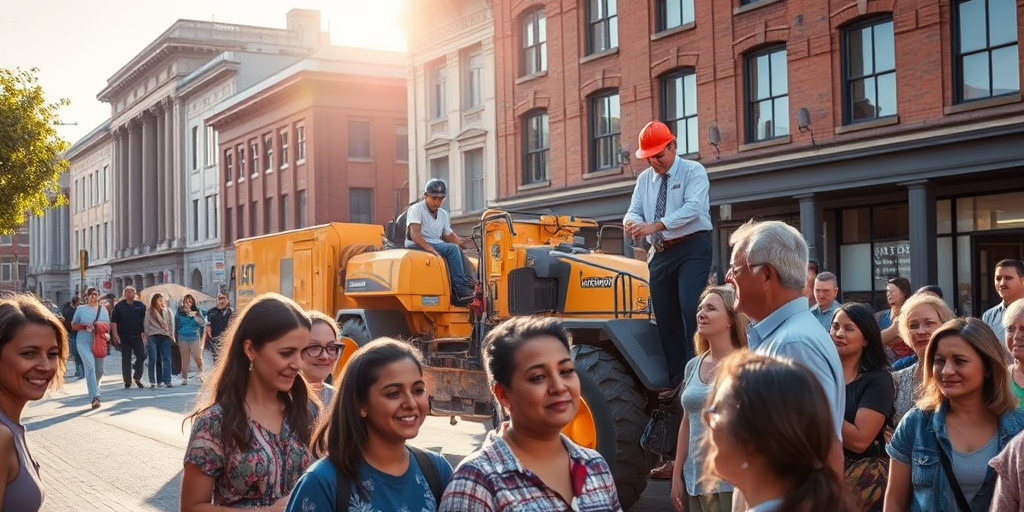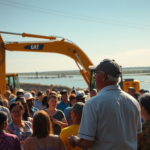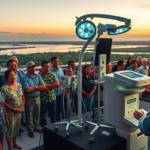**New Machine Revolutionizes Pothole Repairs in Edinburg**
Edinburg roads are experiencing a transformative change, thanks to the introduction of the state-of-the-art Asphalt Zipper. This $300,000 machine is revolutionizing how the city addresses its longstanding issue with pothole-riddled streets, offering a more cost-effective and efficient solution.
**A Groundbreaking Approach to Road Repairs**
The Asphalt Zipper has recently been deployed by the Edinburg Public Works Department to tackle roads with severe damage, notably on Chapin Street and Monmack Road. Over 50 other roads have been earmarked for repair in the coming weeks, marking a significant expansion of the city’s road maintenance efforts.
Vincent Romero, Director of Edinburg Public Works, provided insight into the machine’s innovative technology. “The Asphalt Zipper pulverizes all the asphalt and part of the base, known as the caliche,” Romero explained. “After pulverizing, we recompact and reconstruct the base before paving over it.”
This method allows the machine to complete the task in a single step, slashing costs by reducing reliance on additional equipment and manpower. According to Romero, the repairs made using this technology are designed for longevity, offering a permanent solution to road damage.
**The Local Impact and Broader Implications**
Incorporating the Asphalt Zipper into the city’s maintenance arsenal represents a significant local impact. Not only is the machine expected to save money, but it will also reduce the time taken to repair roads, minimizing disruptions for commuters and enhancing road safety.
Edinburg Mayor Richard Molina emphasized the machine’s role in improving the quality of life for Valley residents. “By addressing road conditions more effectively, we’re investing in the community’s safety and economic vitality,” Molina stated. “Improved infrastructure can lead to better business prospects and enhance the overall livability of our city.”
For South Texas, particularly the Rio Grande Valley (RGV), this development is a promising step forward in addressing infrastructure challenges. The region is frequently plagued by road issues exacerbated by the harsh weather conditions typical of the area, as highlighted by the recent weather forecasts predicting continuous spotty showers and temperatures soaring in the 90s.
**Connecting to Regional Development Efforts**
The advancements in Edinburg’s approach to road repair coincide with broader community-focused initiatives across the RGV. For example, San Benito city leaders are seeking to enhance a local nature preserve, and new public transport technology is being introduced, such as a real-time bus tracking app for Valley Metro riders.
These parallel developments underscore a period of revitalization and modernization in the region, targeting longstanding issues related to infrastructure, mobility, and quality of life. By working to address these challenges, the RGV is positioning itself as a hub of community development and innovation.
**Potential Challenges and Future Directions**
While the adoption of the Asphalt Zipper marks a positive development, its implementation is not without challenges. The high initial investment costs need to be balanced against potential budget constraints. Nonetheless, the city’s commitment to leveraging this technology reflects a proactive strategy to prevent more extensive and costly repairs down the line.
As Edinburg looks to the future, continued transparency and community engagement will be vital. Romero mentioned that the public works department is compiling a list of roads in dire need of repair, inviting community members to participate in identifying priority areas.
Local residents interested in learning more or reporting road issues can reach out to the Edinburg Public Works Department. Community forums and digital platforms will provide additional opportunities for residents to stay informed and involved in the city’s infrastructure developments.
**Conclusion**
The integration of the Asphalt Zipper into Edinburg’s road maintenance strategy is a promising advancement. By addressing pothole issues with greater efficiency and financial prudence, the city not only enhances its roadways but also sets a precedent for other communities in the RGV. These efforts highlight a broader commitment to fostering community interest, addressing local impact strategically, and ultimately, paving the way for a more resilient and connected South Texas.







